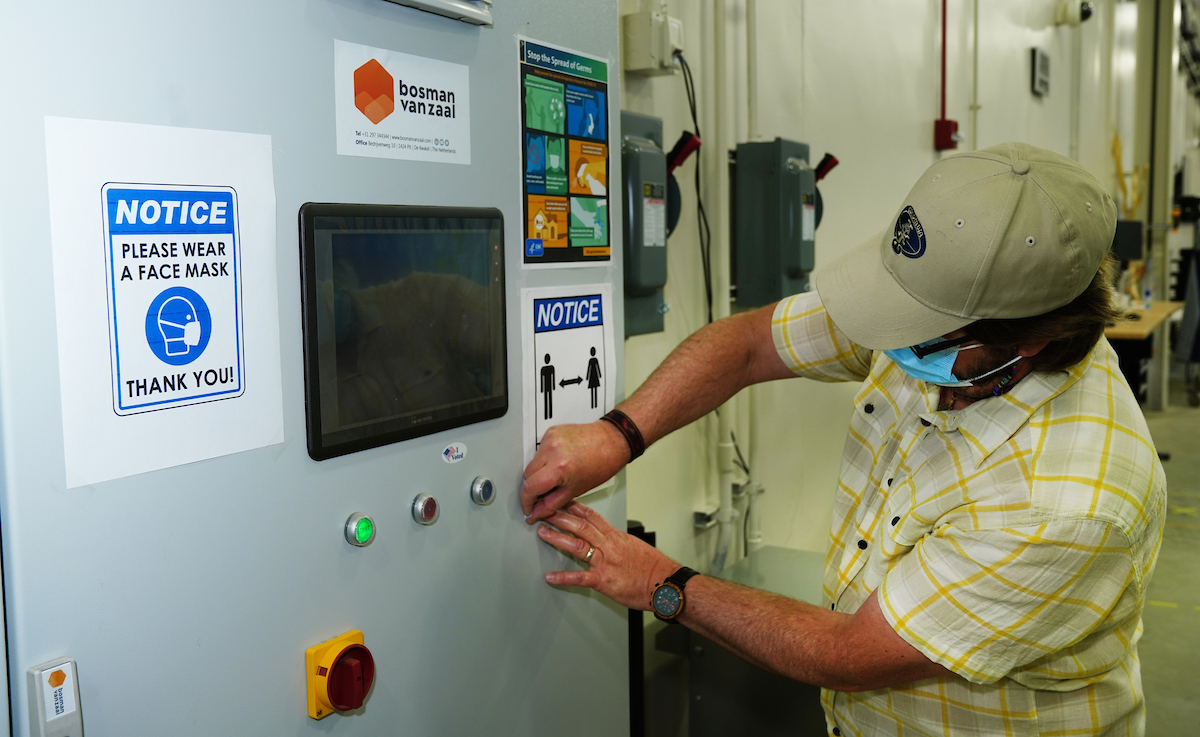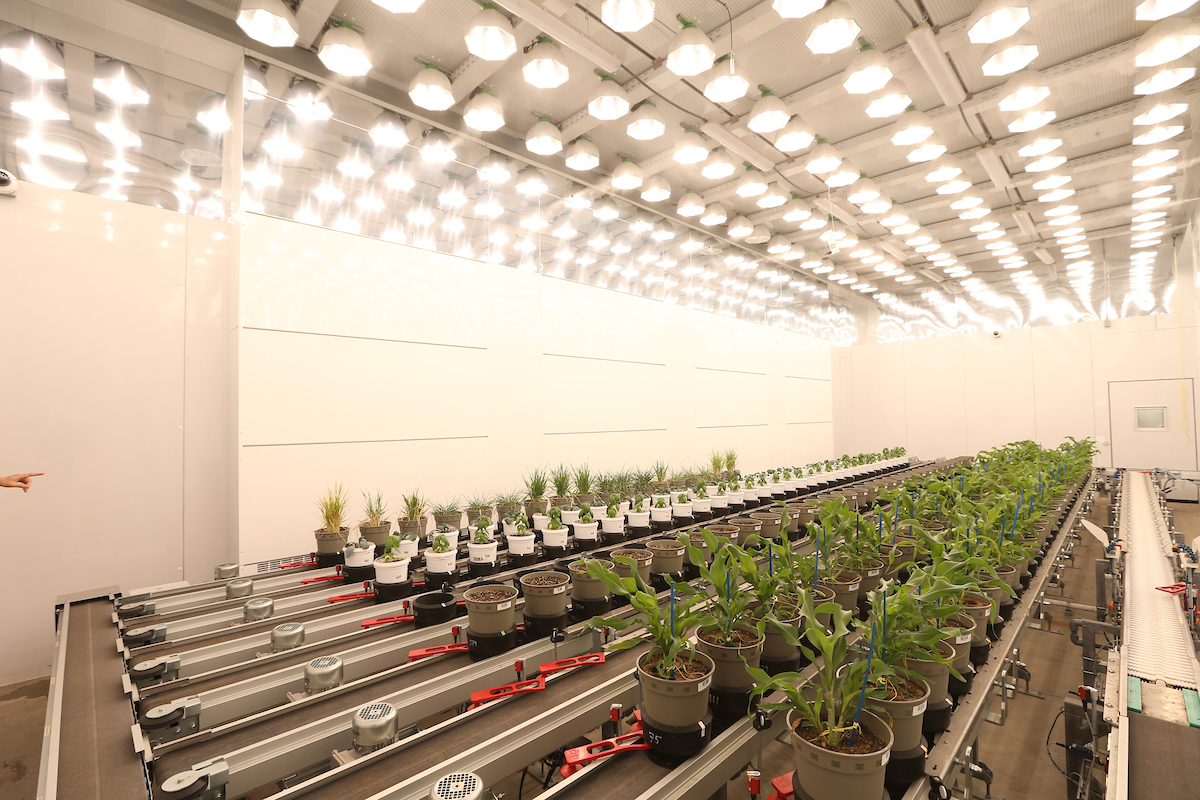Behind the Research: Chris Hoagland
Many people are involved in the remarkable range of programs, services and facilities that undergrad research in the College of Agriculture. Collectively they’re integral to the college fulfilling its research mission. “Behind the Research” explores their individual roles. Each academic year, we profile six people whose work supports the College of Agriculture’s global reputation for developing innovative, multidisciplinary solutions to challenges and then putting those solutions into action.
Chris Hoagland, Facility Manager, Ag Alumni Seed Phenotyping Facility
- Responsible for operation of the AAPF and managing cutting-edge research for above-ground studies of plants from 20 centimeters to 4 meters in height as well as their root systems.
- Balances research operations with leading tours: “There’s a lot of interest in what Purdue has built here.” More than 2,500 people from every continent except Antarctica have toured the AAPF since it opened.
- Set up systems from his home to keep the AAPF fully operational throughout COVID disruptions using remote connections with several phenotyping platforms.
Chris Hoagland, Facility Manager, Ag Alumni Seed Phenotyping Facility
Watering plants may sound easy. But for Chris Hoagland, facility manager of the Ag Alumni Seed Phenotyping Facility (AAPF), four pieces of software must communicate in real time to deliver the dosage of water and fertilizer a researcher has specified for each plant moving through the AAPF’s automated systems.
The AAPF is complex, and Hoagland knows it better than anyone.
Before coming to Purdue in 2010, Hoagland worked in plant breeding for over 20 years in Nebraska and Washington. He holds bachelor’s and master’s degrees from the University of Nebraska and regularly returns to the state to help his parents on the family farm where he grew up. “I’ve been involved in agriculture for almost my entire life,” he says.
During his first seven years at Purdue Hoagland worked in programs related to maize and soybean breeding. He started his current job about six months before the AAPF opened in February 2018, when “planning and construction meetings were still occurring, and a lot of details were being hammered out,” he says.
 Chris Hoagland, Facility Manager, Ag Alumni Seed Phenotyping Facility
Chris Hoagland, Facility Manager, Ag Alumni Seed Phenotyping Facility “Since it is a custom-designed facility, there’s no manuals for any of this stuff,” he adds. “We had to self-train on everything, and the way we did that was through trial and error. There are so few of these facilities in the world that you don’t have other places to go see how they do it.”
The AAPF is a core component of the Institute for Plant Sciences. The 7,300-square-foot facility complements Purdue’s field-based phenotyping capabilities by enabling researchers to study plant traits under precise environmental control. As its manager, “I am a cog in a wheel turning within the research engine at Purdue,” Hoagland says.
Purdue took a unique approach to building the facility by using different vendors to customize each system and sub-system, he says. “Nobody that we’re aware of is using these kind of subsystems in a way that we are to make them fully automated. There are several things to manage at once, and a lot of these systems are communicating back at forth.”
He credits AgIT for creating two key software programs — the Purdue Irrigation Manager and Purdue Phenotyping Experimental Wizard — and ensuring their compatibility with the facility’s automation as well as its off-the-shelf fertigation unit.
The irrigation system delivers different treatments to plants in varied research projects seven days a week. “Irrigation is the most critical thing that has to occur each day,” Hoagland says.
“This facility runs 24/7 as long as we have electricity and chilled water and networking.”
His responsibilities include monitoring several systems each day. “We never know when we’re going to have a hiccup,” he says. “Sometimes I can get myself out of jams, but sometimes I go back to the programmers or engineers,” he says.
 The AAPF staff normally waters between 4 a.m. and 8 a.m., so if a problem occurs, Hoagland can reach his vendors in the Netherlands and Germany during their working hours. “When we have problems that we can’t solve that day, or if it’s late in the day, we’ll share the observation with the vendor, and they will peer into the system while we’re sleeping. Hopefully when I wake up, I’ll have messages that they’ve looked into it or solved a problem or they need me to go in and do something to help them.”
The AAPF staff normally waters between 4 a.m. and 8 a.m., so if a problem occurs, Hoagland can reach his vendors in the Netherlands and Germany during their working hours. “When we have problems that we can’t solve that day, or if it’s late in the day, we’ll share the observation with the vendor, and they will peer into the system while we’re sleeping. Hopefully when I wake up, I’ll have messages that they’ve looked into it or solved a problem or they need me to go in and do something to help them.”
The AAPF opened with one growth chamber, and a second brought online in February 2022 doubled capacity. Hoagland is part of a small AAPF team that includes Yang Yang, director of digital phenomics, facility specialist Mike Gosney and postdoc fellow Sungchan (Sun) Oh.
“I really enjoy working with our plant science team,” he adds. “I enjoy learning about people’s research and how we can leverage this facility to meet some of their objectives. We learn new things all the time.”






